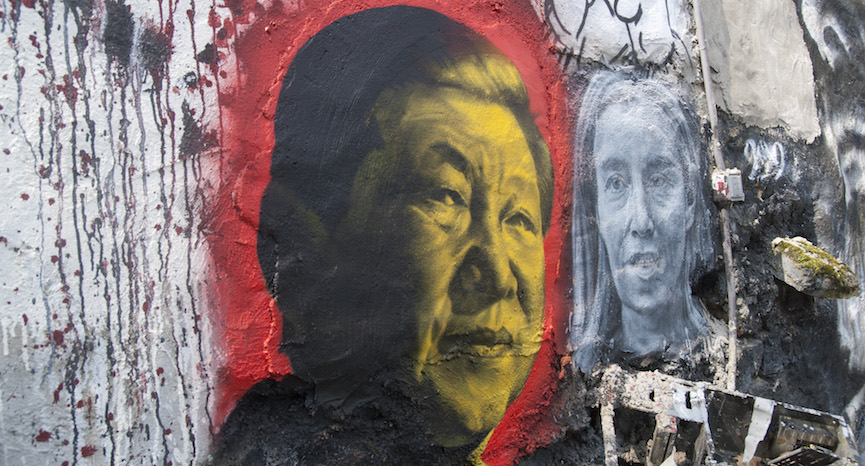What took me aback (an underused word I resolve to employ more in the New Year) in Canadian reactions to the current impasse with China, was the vehemence. Columnist Paul Wells said China was loansharking its way across the world with its Belt and Road Initiative.
It’s true China isn’t building infrastructure almost everywhere for free, but neither did the Marshall Plan, which was more modest, and exacted additional tribute in the form of undermining unions and left wing parties — yet gets extremely good press.
China is building roads etc., in possibly 30 African nations, but then the U.S. has 34 African military bases. “The hard men of Beijing have shown their true faces,” said a Globe editorial, in contrast with the U.S., “our main ally and our fellow democracy and rule-of-law society.”
That’s a generous reading. The U.S. has removed its signature from the TPP, the Paris climate accord, the Iran treaty, the nuclear forces treaty with Russia, refused to join the International Criminal Court, along with breaking countless treaties with native peoples and being found guilty at The Hague for its war on Nicaragua in the 1980s.
I know this is whataboutism but whataboutism has its place, if you’re trying to comprehend a uniquely perfervid response to normal great power behaviour.
Take Andrew Coyne, the Patrick Marleau of Canadian media hysteria. He said Huawei “may not be state-owned but is certainly under state tutelage.” Quite right, as are the U.S. members of what president Eisenhower called the ‘military-industrial complex’ and which now includes the FAANGs. Why does Coyne speak as if it’s true of China but not everyone else?
On the Huawei executive detained by Canada: “if there is not proof beyond a reasonable doubt no American court will convict her.” Of course not, guilty people never walk free from U.S. courts. Coyne adds, we’re not “caught in the middle between the U.S. and China … we are on the side of the Americans.”
Depends who we is. Tell it to Latin Americans: 200,000 Guatemalans who died after a U.S.-instigated coup, 75,000 in El Salvador’s barbaric civil war, 30,000 Argentines after the U.S. OK’d a military takeover in 1976.
Or: “China must be made to see actions have consequences.” (Thanks for pointing that out, said China, which endured 25 years of isolation as punishment for its 1948 revolution.)
What Coyne says about China’s rule-of-law failings is true. Rule of law develops falteringly everywhere and here we’ve had ample opportunity to get it right. Even so, Canadian citizen Hassan Diab was arrested in Ottawa on terror charges in 2008, extradited to France, held three years without evidence and only this year returned.
I’m not saying China is a mensch and we aren’t. The Uyghur suppression may be the primary case for a genocide in the world today. I’m saying it’s not outside the norm, given its own historical circumstances.
Yet it feels like Fu Manchu and the Yellow Peril are back. Where did they go, like Joe DiMaggio, so it seemed they’d vanished forever? It’s similar to the revival of anti-Semitism, which appeared to be, if not obliterated, dispersed to the grottiest corners, from which rehab was unlikely. It simply wasn’t so.
I find both cases mysterious, though one thing we’ve learned from the current anti-racist and gender movements, is how deep and pervasively those impulses run, and how difficult they are to uproot, if you’re serious about the job.
The Trump moment adds its own complications: like a desire to believe China could be a force for good in this grim pass, then feel let down when it isn’t a clear and positive alternative to Trump’s U.S. But that’s no reason to turn around and idealize the U.S. At least China provides some quantitative balance, if not a moral one. Have to take what you can get, sometimes.
So where’s hope, in this hopeful season? After the Second World War, people of good will turned to the potential of global institutions like the UN. Its preamble said they were ‘determined’ to avoid the hells they’d experienced ‘twice in our lifetime.’ They weren’t smarter than we are but they’d been through worse and learned from it. It lent determination. That’s as Christmasy as I can manage.
This article originally appeared in the Toronto Star.
Image: thierry ehrmann/Flickr
Help make rabble sustainable. Please consider supporting our work with a monthly donation. Support rabble.ca today for as little as $1 per month!





